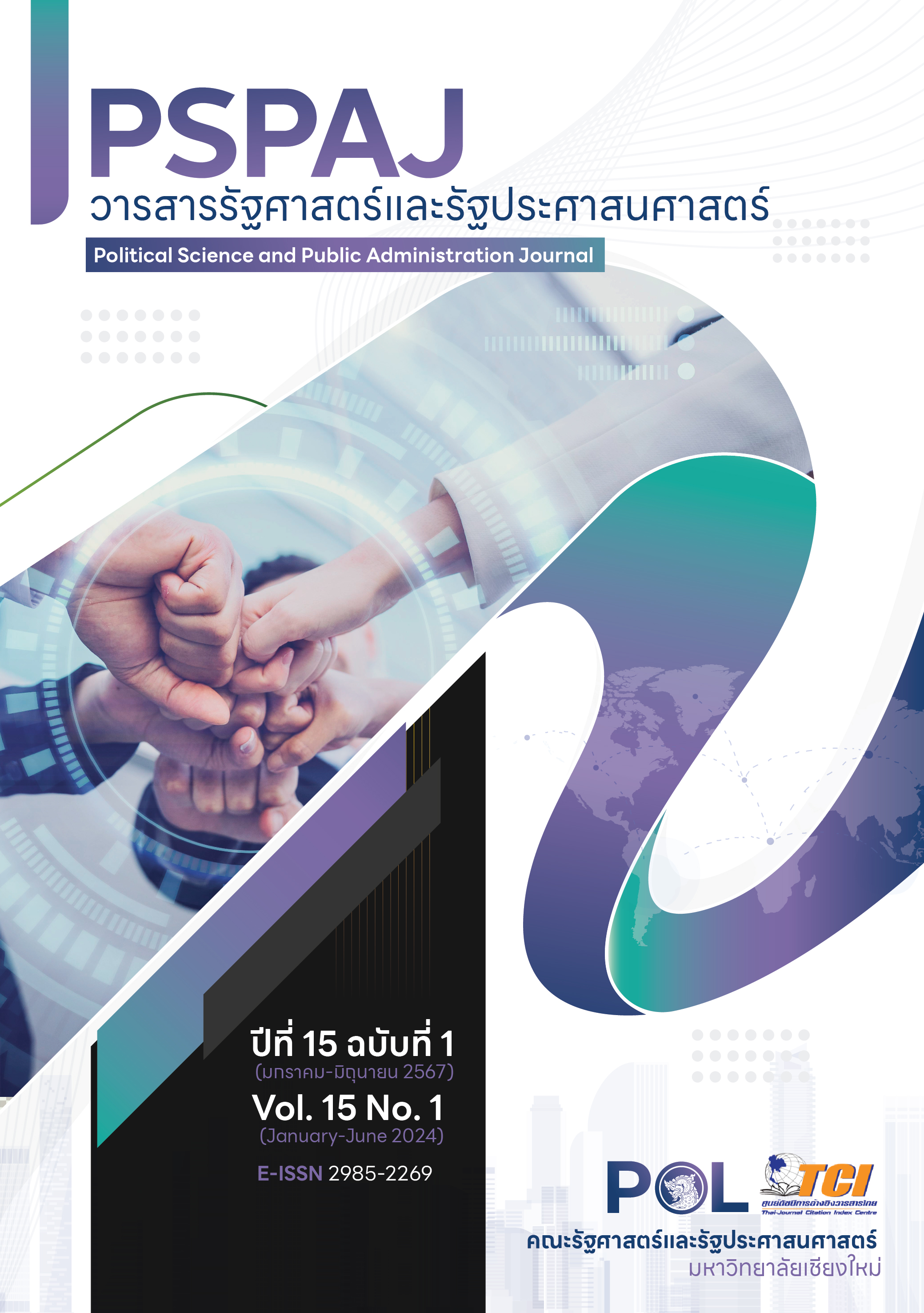การตัดสินใจทำงาน และคุณภาพชีวิตของแรงงานไทยในสาธารณรัฐเกาหลี
Main Article Content
บทคัดย่อ
บทความวิจัยชิ้นนี้เป็นการวิจัยเชิงคุณภาพโดยใช้การสัมภาษณ์เชิงลึกและเอกสารด้านนโยบายที่เกี่ยวข้อง วัตถุประสงค์เพื่อศึกษาปัจจัยที่นำไปสู่การตัดสินใจในการเข้าไปทำงาน และประสบการณ์ใช้ชีวิตของแรงงานไทยที่เคยผ่านการทำงานในสาธารณรัฐเกาหลี เพื่อให้ข้อเสนอแนะเชิงนโยบายในการช่วยจัดการด้านแรงงานไทยในสาธารณรัฐเกาหลี มีผู้ให้ข้อมูล คือ แรงงานไทยที่เคยไปทำงานสาธารณรัฐเกาหลีและได้กลับมายังประเทศไทยแล้ว และแรงงานไทยที่กำลังทำงานอยู่ในสาธารณรัฐเกาหลี ทั้งแบบถูกกฎหมายและผิดกฎหมายในประเภทงานเกษตรและปศุสัตว์ หรืองานอุตสาหกรรม หรืองานด้านบริการ การศึกษาพบว่า สาธารณรัฐเกาหลีเป็นเป้าหมายหลักของแรงงานไทยในการเคลื่อนย้ายแรงงาน รัฐบาลของสาธารณรัฐเกาหลีเปิดรับแรงงานจากต่างประเทศ เพื่อให้ผู้ที่ต้องการทำงานในสาธารณรัฐเกาหลีสมัครงานผ่านระบบอนุญาตการจ้างงาน โดยมี 3 ประเภทงานที่แรงงานจากประเทศไทยสามารถทำได้ ได้แก่ งานเกษตรและปศุสัตว์ งานอุตสาหกรรม และงานก่อสร้าง บางรายที่ต้องการทำงานและไม่สามารถสอบผ่านระบบการอนุญาตจ้างงาน จะทำการลักลอบเข้าไปทำงานแบบผิดกฎหมายโดยผ่านช่องทางการอนุญาตให้พำนักชั่วคราว (90 วัน) ทั้งนี้ ลักษณะงานของแรงงานที่ลักลอบเข้าไปทำงานแบบผิดกฎหมายจะมีประเภทงานบริการ (งานร้านอาหาร, งานนวด, งานบริการนำเที่ยว) เพิ่มเติมจากงานของระบบการอนุญาตจ้างงาน โดยแรงงานเหล่านี้จะได้รับค่าจ้างระหว่าง 1,800,000 - 5,000,000 วอนต่อเดือน ขึ้นอยู่กับประเภทงานด้านสวัสดิการ แรงงานแบบถูกกฎหมายจะได้รับการคุ้มครองผ่านสวัสดิการแรงงานตามมาตรฐานการจัดการสวัสดิการแรงงานสากล แต่แรงงานผิดกฎหมายจะไม่ได้รับสวัสดิการใดๆ เลย การดูแลแรงงานจึงขึ้นอยู่กับนายจ้าง ด้านข้อเสนอแนะเชิงนโยบาย แบ่งออกเป็น 3 ข้อดังนี้ 1) ประเทศผู้ส่งออกแรงงานและประเทศผู้รับแรงงานทำข้อตกลงและจัดการระบบการอนุญาตทำงานผ่านหน่วยงานเอกชน เพื่อความรวดเร็วของขั้นตอนการดำเนินการแต่อยู่ภายใต้การกำกับดูแลของรัฐ ทั้งนี้ หากแรงงานมีนายจ้างก่อนการเข้าไปทำงานสาธารณรัฐเกาหลีให้นายจ้างเกาหลีสามารถนำแรงงานไปขึ้นทะเบียนเป็นแรงงานแบบถูกกฎหมายได้ 2) เพิ่มกลุ่มอาชีพด้านงานบริการ เนื่องจากงานในประเภทนี้เป็นกลุ่มงานที่คนเกาหลีไม่นิยมทำ 3) ประเทศผู้ส่งออกแรงงานเป็นผู้เสียเปรียบด้านกำลังแรงงานในวัยทำงานและยังต้องดูแลแรงงานนั้นในวัยพึ่งพิง (วัยเด็กและวัยผู้สูงอายุ) โดยผู้วิจัยมองว่าประเทศต้นทางควรขับเคลื่อนเศรษฐกิจแบบจริงจัง และมีธรรมาภิบาลจากผู้ปกครอง เพื่อให้ประชาชนเกิดมุมมองที่ดีต่อประเทศของตนเองและไม่จำเป็นต้องเคลื่อนย้ายแรงงานออกไปนอกประเทศ
Downloads
Article Details

อนุญาตภายใต้เงื่อนไข Creative Commons Attribution-NonCommercial-NoDerivatives 4.0 International License.
- เนื้อหาและข้อมูลที่ลงตีพิมพ์ในวารสารรัฐศาสตร์และรัฐประศาสนศาสตร์ถือเป็นข้อคิดเห็นและความรับผิดชอบของผู้เขียนบทความโดยตรง ซึ่งกองบรรณาธิการวารสารรัฐศาสตร์และรัฐประศาสนศาสตร์ ไม่จำเป็นต้องเห็นด้วย หรือร่วมรับผิดชอบใดๆ
- บทความและข้อมูล ที่ได้รับการตีพิมพ์ในวารสารรัฐศาสตร์และรัฐประศาสนศาสตร์ ถือเป็นลิขสิทธิ์ของวารสาร หากบุคคลหรือหน่วยงานใดต้องการนำข้อมูลไปใช้ประโยชน์ในทางวิชาการ ขอให้อ้างอิงแหล่งที่มาด้วย
เอกสารอ้างอิง
EPS Employment Permit System. (2558). การคัดเลือกคนงานต่างชาติทั่วไป(E-9) – ขั้นตอนการเข้าประเทศ. สืบค้นเมื่อ 3 มิถุนายน 2565, จาก https://www.eps.go.kr/eo/NatCntnViewR.eo?natNm=th&hiMenuId=369&menuId=393
Isaranews. (2563). สถิติคนไทย: แรงงานไทยอาศัยในเกาหลีใต้. สืบค้นเมื่อ 23 มกราคม 2564, จาก https://www.isranews.org/infographic/86224-infoghost.html
เศกสิน ศรีวัฒนานุกุลกิจ. (2541). คุณภาพชีวิตการทำงานของแรงงานไทยในญี่ปุ่น: ศึกษากรณีแรงงานนอกกฎหมาย (รายงานการวิจัย). เชียงใหม่: คณะสังคมศาสตร์ มหาวิทยาลัยเชียงใหม่.
กระทรวงแรงงาน. (2562). แรงงานไทยในสาธารณรัฐเกาหลี. สืบค้นเมื่อ 24 มกราคม 2564, จาก https://korea.mol.go.th/working_abroad/แรงงานไทยในสาธารณรัฐเกาหลี
ธเนศ ศรีวิชัยลำพันธ์. (2558). เศรษฐศาสตร์แรงงาน (Labor Economics). สืบค้นเมื่อ 5 กันยายน 2564, จาก http://fuangfah.econ.cmu.ac.th/teacher/thanes/files/Book%20Econ%20440%20(2015).pdf
นราธิป ชุติวงศ์. (2546). ทฤษฎีเศรษฐศาสตร์จุลภาค. กรุงเทพฯ: คณะเศรษฐศาสตร์ จุฬาลงกรณ์มหาวิทยาลัย.
มหาวิทยาลัยเชียงใหม่. (2534). เอกสารประกอบการเรียนการสอนจิตวิทยาทั่วไป (พิมพ์ครั้งที่ 2). เชียงใหม่: สำนักพิมพ์มหาวิทยาลัยเชียงใหม่.
สุมาลี ปิตยานนท์. (2539). เศรษฐศาสตร์ทรัพยากรมนุษย์: การศึกษาและการฝึกอบรมในประเทศไทย. กรุงเทพฯ: คณะเศรษฐศาสตร์ จุฬาลงกรณ์มหาวิทยาลัย.
PopulationPyramid.net. (2021). Republic of Korea 2021. Retrieved October 23, 2021, จาก https://www.populationpyramid.net/republic-of-korea/2021/


